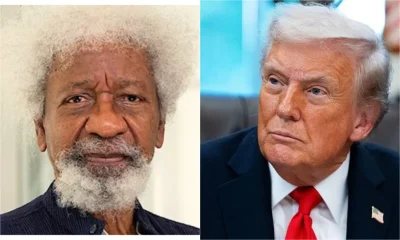WORLD
Trump’s First Promise to Israel Revealed. What is this all about?

Donald Trump’s first promise to Israel, as reported by Israel’s Channel 12, was stark in its clarity: “On the first day of my term, I will cancel all restrictions and delays on the transfer of armaments and combat equipment to Israel.” This vow was a clear signal of his unwavering commitment to strengthening Israel’s military capabilities.
True to his word, Trump took immediate steps to enhance Israel’s defense infrastructure, including the expedited delivery of advanced weaponry and military support. His decision had profound implications, particularly for the ongoing conflict in Gaza and the broader geopolitical dynamics of the Middle East.
The immediate effect was a strengthening of Israel’s ability to carry out its military operations, many of which were seen by critics as contributing to a cycle of violence and repression against Palestinians.
For Israeli Prime Minister Benjamin Netanyahu, Trump’s actions provided an invaluable lifeline. With the flow of advanced military equipment uninterrupted, Netanyahu’s government was emboldened to continue its controversial policies in Gaza and the West Bank, including settlement expansion and military operations against Palestinian militants.
Critics argue that this support from the U.S. administration enabled Israel to pursue a policy of ethnic cleansing and military aggression with little fear of international reprisal. The continued slaughter of Palestinian civilians in Gaza, as well as the annexation of portions of the West Bank, were seen by many as direct outcomes of this military bolstering.
Trump’s unwavering support for Netanyahu, regardless of the humanitarian cost, sent a powerful message to the international community: that Israel’s military actions would remain virtually untouchable under U.S. patronage.
On the flip side, Trump’s policy in the Middle East was not limited to just supporting Israel. His administration also sought to ensure that U.S. military presence in the region remained robust, particularly in relation to countering Iran.
The U.S. military’s deployment of additional assets to the region was designed to send a strong message to Tehran: that it should not intervene in Israel’s operations, especially in Gaza. Trump’s military buildup aimed at deterring Iran from taking any action to halt Israel’s military campaign, ensuring that the Israeli government could continue its operations without facing external intervention.
Iran, with its growing influence in the region and its vocal support for Palestinian rights, found itself at an increasingly tense crossroads, balancing its regional ambitions with the desire to protect Palestinian sovereignty and counter Israeli aggression.
For Iran, the situation was dire. The U.S. and Israel, both in lockstep, were making it clear that there would be little room for diplomatic or military resistance to their plans in Gaza and the West Bank. As the violence escalated, Iran found itself faced with a difficult decision: whether to challenge the U.S. and Israeli alliance directly, risking further military escalation, or to watch helplessly as Israel continued its expansionist policies, crushing Palestinian resistance under the weight of overwhelming military force.
The Palestinian people, caught in the crossfire of these geopolitical maneuverings, faced an increasingly uncertain future, as both regional and global powers appeared more concerned with their strategic interests than with ending the bloodshed. For many in the region, the cycle of violence and repression seemed set to continue, with little hope for a resolution.















![Top Nigeria Newspaper Headlines Today 25th June 2024 [Tuesday] 87 Nigeria Newspaper Headlines](https://nigerianews247.com/wp-content/uploads/2024/04/Nigeria-Newspaper-Headlines-80x80.png)

![[VIDEO] Tinubu Stumbles while Boarding Presidential Parade Vehicle at Eagles Square 90 Tinubu Stumbles while Boarding Presidential Parade Vehicle at Eagles Square](https://nigerianews247.com/wp-content/uploads/2024/06/Tinubu-Stumbles-while-Boarding-Presidential-Parade-Vehicle-at-Eagles-Square-80x80.jpeg)


You must be logged in to post a comment Login